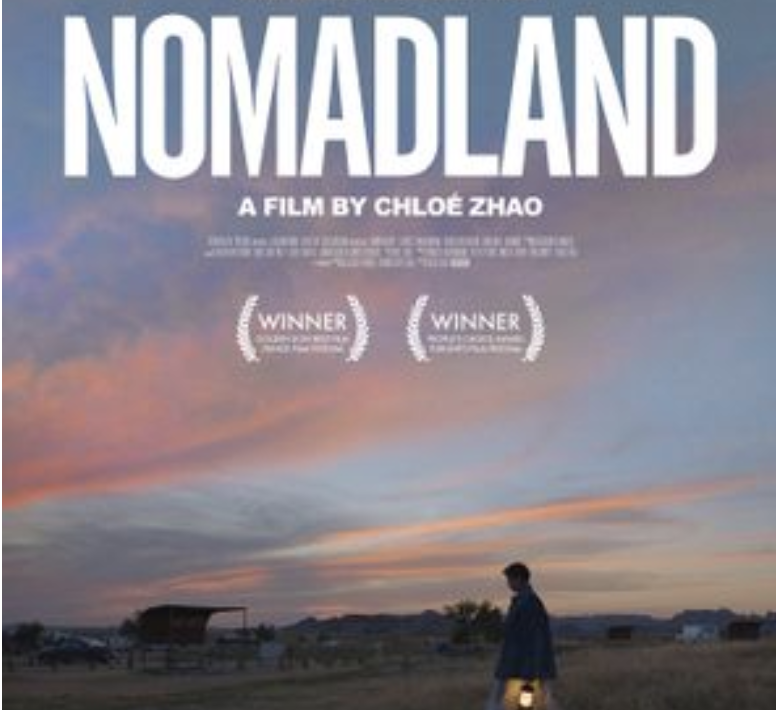The Conservative Critic
The Conservative Critic, Oscar Watch: Nomadland

With awards season upon us, the pinnacle of Hollywood accolades is beginning to polish its famous golden statues. On March 15, 2021 the Academy will announce its list for Best Picture nominations. But using our crystal ball, critics can guess what movies are the most likely to make the final list. To prepare you for the big day, the Conservative Critic will spend the next several weeks reviewing the front runners leading up to the big day where we’ll give you our ranking from best to worst of the Academy Award Best Picture nominees for 2021.
Nomadland is in the front of the pack for likely Best Picture nominees and today I will be answering the trademark (metaphorically) questions of the Conservative Critic: “Was in Entertaining?” “Did it have artistic/intellectual value?’ and most importantly, “Was it liberal propaganda?”
Nomadland
Overall rating: Very Good
Nomadland follows the real-life inspired story of Fern who has lost everything when US Gypsum Mine left Empire, Nevada in the wake of the market crash of 2009 and the subsequent Great Recession in 2011. With her husband passed, Fern must make a new life for herself and inspired by her friend and fellow Empirian, Linda May, discovers the Nomad lifestyle.
As beautiful as it is thoughtful, the restrained 1 hour and 47 minute, Nomadland gently mesmerizes the viewer into an education on the mechanics of moving on and the humanity of connection whilst holding our nose to the work which makes America function. If the viewer is willing to surrender themselves to the film, it is a very good watch.
Was it entertaining?
Rating: For an introspective character drama based on a true story; yes
The Conservative Critic judges films based on their intention. There is no comparing this movie to one of the Marvel super franchise installments (though ironically the film’s director, Chloe Zhao took the helm at Eternals one of the next in the Marvel lineup releasing in November). To decide if a film is high quality or entertaining it’s important to let it stand on the merits of what it was attempting to achieve re: thrills, education, emotion etc.
If the viewer is someone who enjoys a film of its kind then yes it was entertaining. The character of Fern played by Hollywood favorite (in a good way), Frances McDormand is easy to root for and her story, though simple, has enough mystery that the viewer is captivated early on trying to peel back her layers.
The fact that the story is not only based on real events but also features real-life nomads playing fictionalized versions of themselves is no small part of why the film is special. There is something comfortingly human about listening to these individuals tell their stories and their truth as a form of fictional narrative.
Finally, the movie finds the right level of emotional evocation. Rarely in award seeking films is there such restraint in favor of truth. The viewer is swept into tears in the quiet scenic moments of Fern’s life without having to be pushed by overly tooled traumas or intensely intimate griefs. The truth of loss and life and memory is preciously held in the film and enough to bring anyone along for a somber but hopeful ride down its many roads.
Did it have intellectual/artistic value?
Rating: Masterpiece
The film is fairly near flawless in its artistry and execution. Chloe Zhao, who both wrote (adapted from the book by the same name) and directed, brought a truly fresh technique to an industry suffering from formulaic burn-out.
The choice to use the real life nomads on which the movie was based without dipping into documentary was, to put it simply, very smart. Zhao executed her vision with respect, never once dipping into condescension and carefully blending truth with ideas until the two were inextricable. I am unaware of another film to so heavily rely on real-life subjects to display the dramatization of their own story and it gave the movie soul where movies of its kind might have otherwise wandered into an overly intellectualized theory of nomadic life which would have been far less interesting.
There is something inherently loveable about the film’s lead actress, Frances McDormand.
Everything she touches is gold and she’s America’s favorite “real-life” woman. Not quite a chameleon, McDormand brings herself (or more accurately her signature screen persona) to each role and Fern was no different. Vulnerable, strong and off-beat – McDormand presents Fern with enough intimacy to imagine she might smell like soap and cigarette smoke but enough distance that you never learn her interests or motivations beyond the lens of her loss and her efforts to move on.
Zhao took care to weave casual metaphors into her panoramic storytelling which added pleasant and comforting depth particularly in her use of sunsets and sunrises – a phenomena in which so many feel so deeply connected. Almost all of the movie is filmed as the sun is setting which is not only beautiful in terms of the films overall aesthetic and lighting but it also evokes the familiar feeling of conclusion and of moving on to the next day which is central to the core theme of the film. It served as somehow subtle yet technically on-the-nose metaphor for Fern living in the sunset of her life which reminds us that the sunset is the most beautiful part.
Near the end of the film, Zhao briefly pivots to the use of sunrises as Fern contemplates the potential for a new life and a new opportunity, different than the one she has chosen in her van as a Nomad. She is briefly joined by a baby in these scenes while the rest of the film features almost exclusively individuals over the age of 55. For a moment the viewer is reminded that a sunrise can be as beautiful as a sunset.
The beauty of the film is its true star. The cinematography takes the viewer across the beautiful and wide open spaces of the Great American West from the snowy high desert of Nevada to the canyons of the Dakotas and back to the crashing waves of the Paciic Ocean. A film worthy of use in a Brand USA campaign, it is a true love letter (love postcard?) to the rugged frontier which is still very real west of the Mississippi river.
But in the beauty Zhao does not lose humanity. The humanness of Nomadland shines in perfect harmony with its backdrops. The breathtaking wide shots of the pristine land Americans call home are spotted with scenes of Fern taking on jobs like camp ground manager, beet processor, Amazon fulfillment center worker, and short order cook. She scrubs dirty toilets and shovels crops alongside her nomad friends working to make enough living to move to their next location.
And the friendships and connections take centerstage above the difficult labor. As a campground manager somewhere in the west, Fern and Linda May help a family turn the power back on for their daughter’s birthday party. Linda May ties a balloon around the wrist of the birthday girl as the setting sun lights her cheeks and hair on fire in the wind. It is compositional poetry but it is also very real human connection featuring real life Linda May and a real life little girl.
This level of achievement takes disciplined commitment as well as deep passion for the work. Zhao traveled for months living out of only a van to better understand her nomad subjects and to physically capture the scenes in the film. The truth and tenderness in her story telling was the payoff of her sacrifice. The film is a true gem with very few matches this year.
Was it liberal propaganda?
Rating: Not at all – some conservative values detected
While the internet has taken it upon itself to use the film as a tool to indict Amazon and its practices in seasonal hiring (the merits of which we are not here to discuss) the film itself never dares to cast judgement on any particular employer, lifestyle or choice. Even when Fern has an argument with her brother-in-law about his real estate business (believing it is predatory to buyers) the film never really forces you to decide whether or not Fern is fair or just in her accusations. It is rare in its ability to deliver ideas in a way that is not meant to force the viewer to adopt. Likely because of the independent spirit of the subjects from which the ideas are espoused.
The rugged individualism portrayed throughout the film is a conservative value as old as the American west itself. As a political entity, the Nomads reject capitalism as much of a cage as a libertarian might reject government intervention but all in the spirit of self actualization and defining one’s own path.
There is a sense in the film, lost in current political discourse, that everyone’s path is a little (or a lot) different but that doesn’t mean we can’t connect with each other along the way.
Conclusion
Nomadland is excellent. It is a must watch for anyone who loves landscapes Americana or who has dealt with the life altering realities of loss and grief and who may have lacked the tools they needed to move on. Chloe Zhao is a sensation and I look forward to her blockbuster Marvel project to reveal the level of diversity I imagine she is capable of bringing to the table as a true artisan in her field.
